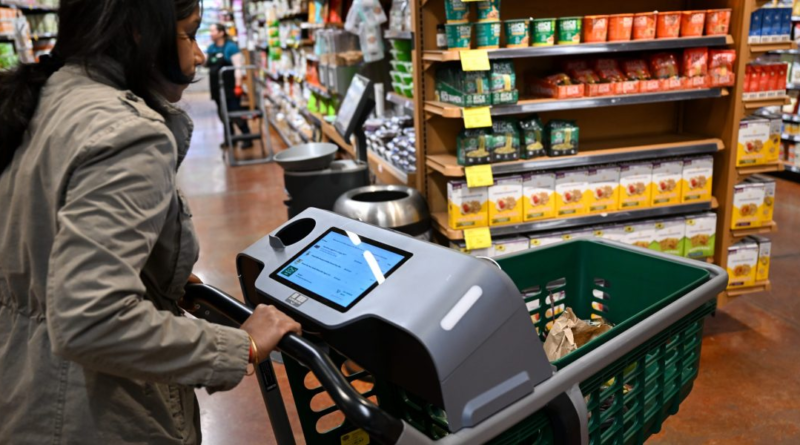Instacart’s AI-powered smart carts, which offer real-time recommendations and ‘gamified’ shopping, are coming to more U.S. grocery stores
Rickety shopping carts are getting a huge upgrade with the help of artificial intelligence.
Instacart expanded its Caper Cart technology, which calculates the total cost of items placed in the cart and lets shoppers skip check-out lines, trialing the tool in Price Chopper and McKeever’s Market & Eatery grocery stores this week. Since Instacart first acquired Caper Cart for $350 million in 2021, 1,500 retail partners including Kroger and ShopRite have implemented the time-saving tech. Instacart plans to distribute thousands of Caper Carts by the end of the year.
“We made an early bet that smart carts would be the winning technology for transforming the in-store grocery experience because it’s a form factor people recognize and it doesn’t require retrofitting a whole store with large capex investments,” Instacart CEO Fidji Simo said in the company’s 2024 first-quarter shareholder letter. “Our Caper Carts do so much more than allow people to skip checkout.”
Beyond recognizing what items shoppers have placed in their carts, Caper Carts sync with grocery stores’ loyalty accounts to give customers discounts and personalized advertisements, and have “gamification” features to give customers rewards for fulfilling certain shopping behaviors like spending a certain amount of money. The company said the product has the ability to increase the size of customers’ purchases and increase shopping efficiency.
“We’re transforming shopping from a chore to an adventure,” Instacart told Fortune.
Retailers have increasingly relied on AI and automatization to eliminate the in-store friction of waiting in lines and shoplifting-driven shrink, part of a growing trend of embracing the omnichannel strategy of rock-solid customer service across in-person and digital platforms. Grocers plan to increase spending on AI technologies by 400% before 2025, according to a June 2023 report from the Food Industry Association and e-commerce service Wynshop. The elephantine investment is predicted to bring in $113 billion in revenue and operational efficiency across the industry.
Those changes can already be seen across grocery stores: Kroger implemented AI to monitor self-checkout lanes to make sure customers are scanning all their purchases; Albertsons experimented with smart shopping carts in 2022 that resembled Amazon’s Dash Carts. Sam’s Club incorporated AI into its Scan & Go technology that lets customers skip the line to get their receipts checked; about 30% of Sam’s Club members use the Scan & Go app, which the company says has helped it convince its growing Gen Z audience of an easy shopping experience.
“We’re going on a journey of saying, ‘You can have great items, great prices like the rest of the club channel, but you can also have convenience,’” Sam’s Club CEO told CNBC in an interview last month. “And that’s something that really is resonating.”
Grocery stores’ AI misses
Instacart’s app-based AI experiments—which include ChatGPT recommending recipes and providing information on food preparation—have sometimes been to its detriment. Its AI-generated recipe images veered into uncanny valley territory, showing conjoined roasted chickens and vegetables on salads that bore scaly resemblances to fish.
But it’s hardly the first time retailers’ trials with similar technologies have backfired. Amazon gave up on its Just Walk Out technology in U.S. stores in April. Instead of relying on the tool that allowed customers to simply exit the store, automatically charging a registered credit card, it would instead switch over to Dash Carts. While the company initially touted Just Walk Out’s AI capabilities, which leveraged cameras to track items shoppers placed in their baskets, there were several reports the technology actually relied on 1,000 workers in India monitoring the camera feeds. The e-commerce giant denied the reports, but said employees in India do spot-check the camera data.
While retailers work to iron out the wrinkles in AI’s effectiveness, there’s the matter of consumers being willing to adopt the new tools, Sudip Mazumder, North America retail industry expert for Publicis Sapient, told Modern Retail. While AI tools appeal to shoppers’ desire to budget, receive personalized discounts, and feel secure against theft, they may also come with some growing pains.
“If you go into self-checkout [for example], what the stores did was move the burden of the store associate onto the consumer,” he said.
Without face-to-face interactions—as well as AI’s capability to still make mistakes that upset customers—the new technologies may not initially feel like an efficiency boost. There could be the unintended consequence of “a very frustrating experience for the consumers,” Mazumder said.




